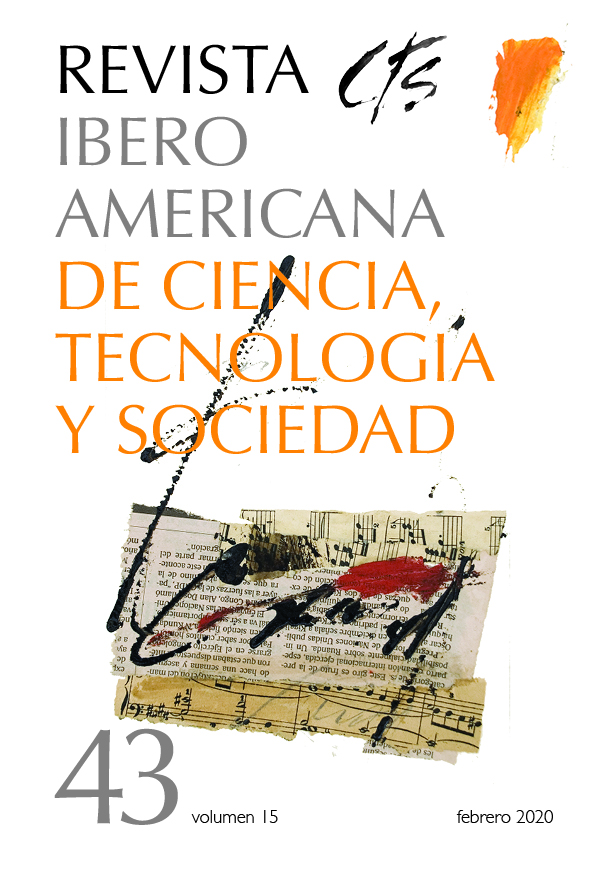On the Track of Brazilian Engineering’s Counter-Hegemony: From Engineering and Social Development to an Engineering of the People
Keywords:
engineering, social development, engineering of the people, university extensionAbstract
This paper aims at considering the benefits of putting scientific and technological development at the service of those who are most in need. We are dealing here, therefore, with John Bernhard Kleba’s ideas related to the creation of an “engaging” engineering. The makeup of the Engineering and Social Development (ESD) field —from 2003 onwards— is analyzed within the context of a progressive administration in the Brazilian government. In a project clearly designed for the expansion of universities, this administration created public policies that encouraged university extension, solidarity-based economy and social technology, which both made the field possible and strengthened it. Methodologically, this paper combines the analysis of documents with participant observation of the National and Regional Meetings of Engineering and Social Development (ENEDS and EREDS, due to their initials in Portuguese). Among our main conclusions, we highlight the consolidation of the ESD field in engineering, as well as its progressive transformation through time, which resulted in the creation of the People’s Engineering Network Oswaldo Sevá. Said transformation is made explicit by the progressive participation of social movements, which started to take part of the ENEDS and EREDS, showing a horizon in the field that abandons the idea of development without the participation of concrete subjects and assumes the ideal of constructing sociotechnical alternatives together with the popular classes.Downloads
References
ALVEAR, C. A. S., CRUZ, C. C., e MIRANDA, P. B. (2017): “O campo da engenharia e desenvolvimento social no Brasil a partir da análise dos anais dos ENEDS”, Revista Tecnologia e Sociedade, vol. 13, nº 27, pp. 188-207.
ARROYO, J. C. e SCHUCH, F. C. (2006): Economia popular e solidária: a alavanca para um desenvolvimento sustentável e solidário, Editora Fundação Perseu Abramo.
BRANDÃO, F. C. (2001): Programa de Apoio às Tecnologias Apropriadas – PTA: avaliação de um programa de desenvolvimento tecnológico induzido pelo CNPq, Brasília, Universidade de Brasília.
DAGNINO, R., BRANDÃO, F. y NOVAES, H. (2004): “Sobre o marco analítico-conceitual da tecnologia social”, en Lassance Jr. et al. (orgs.): Tecnologia social – Uma estratégia para o desenvolvimento, Rio de Janeiro, Fundação Banco do Brasil, pp. 15-64.
DAGNINO, R. (2009): “Em direção a uma tecnologia crítica da tecnologia”, en R. Dagnino (org.): Tecnologia social: ferramenta para construir outra sociedade, Campinas, IG/UNICAMP, pp. 72-111.
FRAGA, L. S. (2012): Extensão e transferência de conhecimento: as Incubadoras Tecnológicas de Cooperativas Populares, tese de doutorado, Instituto de Geociências, Universidade Estadual de Campinas.
INSTITUTO DE TECNOLOGIA SOCIAL (2004): “Tecnologia Social no Brasil: direito à ciência e ciência para cidadania”, caderno de debate, São Paulo.
KAWAMURA, L. (1986): Tecnologia e política na sociedade: Engenheiros, reivindicações e poder, São Paulo, Brasiliense.
KLEBA, J. (2017): Engenharia engajada – desafios de ensino e extensão, Revista Tecnologia e Sociedade, vol. 13, nº 27, pp. 170-187.
LIANZA, S. y ADDOR, F. (2005): Tecnologia e desenvolvimento social e solidário, Porto Alegre, Editora UFRGS.
MACIEL, L. R. (2010): “Política Nacional de Extensão: Perspectivas para a Universidade Brasileira”, Revista Participação: a revista do decanato de extensão da Universidade de Brasília, nº 18, pp. 17-27.
MINISTÉRIO DA EDUCAÇÃO DO BRASIL (2015a): A democratização e expansão da educação superior no país 2003–2014. Disponível em: http://portal.mec.gov.br/index.php?option=com_docman&view=download&alias=16762-balanco-social-sesu-2003-2014&Itemid=30192. Acesso em 02 maio 2017.
MINISTÉRIO DA EDUCAÇÃO DO BRASIL (2015b): Programa Nacional de Extensão Universitária – PROEXT / Programa Mais Cultura nas Universidades, Gramado, RS, MEC. Disponível em: www.ufrgs.br/prorext-siteantigo/arquivos-diversos/PROEXT%20-%20Programa%20Mais%20Cultura%20nas%20Universidades%20-%20MEC.pdf>. Acesso em 02 maio 2017.
NASCIMENTO, C. (2004): A autogestão e o “novo cooperativismo, Brasília, MTE/SENAES.
NIEUSMA, D. y RILEY, D. (2010): “Designs on development: engineering, globalization, and social justice”, Engineering Studies, vol. 2, nº 1, pp. 29-59.
REPOS (2017): Site da Rede de Engenharia Popular. Disponível em: www.repos.net.br. Último acesso em 24/03/2017.
RILEY, D. (2008): Engineering and Social Justice, San Rafael, Morgan and Claypool.
SAREWITZ, D. (1996): Frontiers of illusion: science, technology and politics of progress, Philadelphia, Temple University Press.
SCHUMACHER, E F. (1983): Small is Beautiful: o negócio é ser pequeno, Rio de Janeiro, Zahar Editores.
THOMAS, H. (2009): “De las tecnologías apropiadas a las tecnologías sociales. Conceptos/estrategias/diseños/acciones”, Primeras Jornadas de Tecnologías Sociales, Programa Consejo de la Demanda de Actores Sociales – MINCyT, Buenos Aires.
VASCONCELOS, F. A. G. (2004): “Fome, solidariedade e ética: uma análise do discurso da Ação da Cidadania contra a Fome, a Miséria e pela Vida”, Revista Hist. cienc. Saude - Manguinhos, vol. 11, nº 2, pp. 259-277.
Downloads
Published
How to Cite
Issue
Section
License
All CTS's issues and academic articles are under a CC-BY license.
Since 2007, CTS has provided open and free access to all its contents, including the complete archive of its quarterly edition and the different products presented in its electronic platform. This decision is based on the belief that offering free access to published materials helps to build a greater and better exchange of knowledge.
In turn, for the quarterly edition, CTS allows institutional and thematic repositories, as well as personal web pages, to self-archive articles in their post-print or editorial version, immediately after the publication of the final version of each issue and under the condition that a link to the original source will be incorporated into the self-archive.











